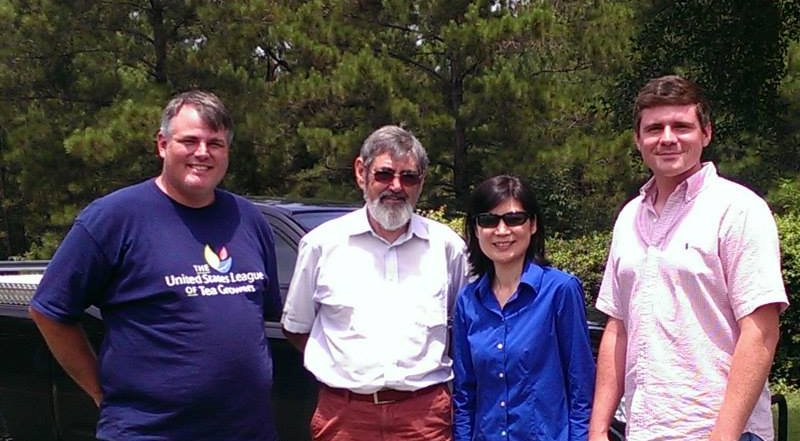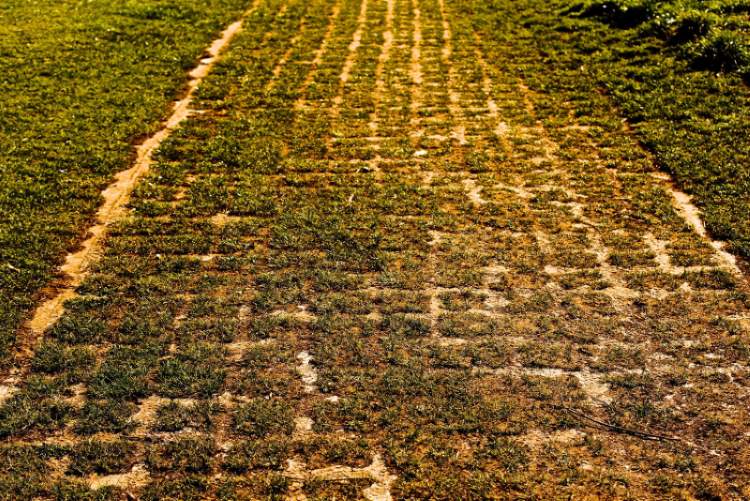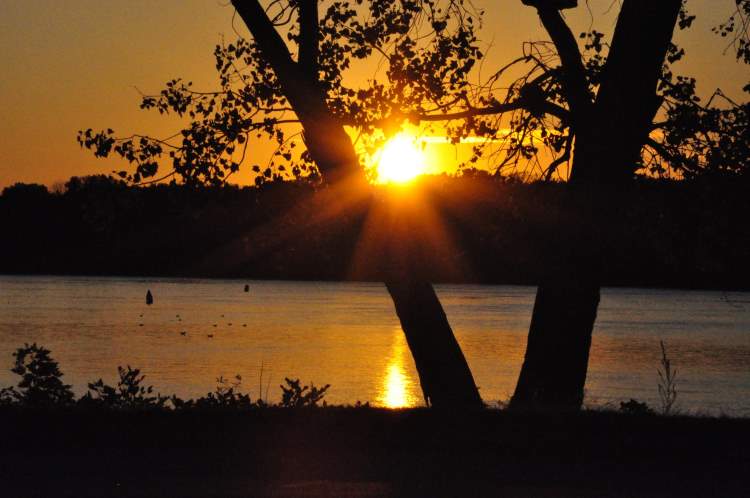
Jason McDonald, Nigel Melican, Dr Bi and Judson LeCompte at J&D Blueberry Farm (via the Great Mississippi Tea Company)
When people talk about where tea is grown, the image in most minds is a mountain or humid field somewhere in Asia. People are also fairly familiar with the idea of tea being grown in Africa, although most of that tea makes its way to Europe. Few are aware, though, that there’s a growing movement of tea growers here in the United States.
Last year, these US growers got together and began the US League of Tea Growers to promote and sustain this movement. You will find growers in places down south and in Hawaii, but you’ll also find growers in Washington State, and New York State.
In her quest to learn more about tea growth and terroir, intern Louise interviewed two folks working on US tea. She talked with Colonel Jason McDonald of the Great Mississippi Tea Company, and consultant Nigel Melican of Teacraft, Ltd. These two are collaborating to create a 5+ acre tea plantation in Mississippi. A unique idea in many many ways. Read below to learn what Louise discovers about the uniqueness of growing tea, let alone in Mississippi:
The Interview
How did you become involved with tea?
Nigel: I was a research scientist with Unilever for 27 years—crop science, agricultural engineering, food technology, product development. About half way through my work with them they sent me to a tea estate in Papua New Guinea to solve a field problem. It turned out to be a factory problem and as I was there I was told “fix it”—I had never been in a tea factory before so I learned about it from the floor up. Since then I have worked in 26 tea growing countries and have manufactured tea on 6 of the 7 Continents (I am still looking for a client wanting to grow tea in Antarctica).
Jason: In 2012, I was on vacation in Charleston, SC and visited the Charleston Tea Plantation. Upon visiting, I heard that tea was a camellia and needed high heat, humidity, ample rainfall, and acidic soil. It immediately clicked with me as something that could be grown in Mississippi. Southwest MS is known for its ease of growing camellias and many cities and towns claim “Camellia Capital” status. Since I am a timber farmer that realized a terrible loss with Hurricane Katrina back in 2005, I had been curiously looking for a substitute crop for timber and tea seemed to fit well with the timber model of delayed returns.
I contacted Mississippi State University Extension Service and Nigel and I found each other over social media (teatra.de) and the quest began.
Also, as a Southerner, sweet tea has always been a staple around our home. The weather is usually too dreadfully hot for hot tea, but iced tea does work well with our given climate.
How long have you been involved with tea?
Nigel: 35 years
Jason: Since May 2012
What factors do you try and control for when growing tea?
Nigel: When tea farming you “control” by choosing the right soil & climate to plant it in, then choose the right plant material and fertilizer regime. The rest is more or less determined by weather—adjusting harvesting timing to suit crop determined by temperature. All a dynamic balance and plenty of compromises. When doing tea R&D (as we do with the Teacraft ECM “tea factory in a box”) we keep all variables constant except one and then control that one to measure the affect—on taste, on chemistry, on value.
Jason: I agree with Nigel

Hit the ground by Charlie Davidson (via 500px)
How do you feel your location & growing conditions influences the flavor of the tea you produce?
Nigel: It has a direct (climate and elevation) and indirect (plant material) effect. Darjeeling teas are produced at 6,000 ft. where it is cool so we would not expect to get a Darjeeling taste in Mississippi, however Assam teas and low elevation Ceylons are grown in climate and elevation very similar to southern USA so we would expect a similarity. Varying our source of plant materials will also affect the flavor—using plants sourced from China will perhaps give more aroma than plants sourced from Africa.
Jason: I agree with Nigel. I also add that we have very unique soil in Brookhaven, MS. It is called Loess. So we are curious as to how this particular soil makeup will influence the taste of tea.
In your opinion, how much does the way tea is grown and cultivated influence the flavor outcome of any given tea?
Nigel: Processing has the biggest effect—I would say 20% of the character is due to growing and 80% due to processing.
Jason: I agree with Nigel.
What are your thoughts on organic farming? Is it important or not? Why?
Nigel: At the fundamental molecular level the plant cannot distinguish between NPK from organic or chemical origin. I prefer to embrace sustainable farming—not taking off the land any more than I put back, and using when possible renewable resources. This has all the benefits of organic farming with fewer of the restrictions.
Jason: I agree with Nigel, we are committed to being ethically sustainable.
…since this has not been done in this area of the country, there are a lot of “unknowns” that we have to take care of as they arise.
What challenges come with growing tea in your location?
Nigel: Summer extreme heat and winter extreme cold. But our tea made it through one of the coldest winters on record so we are in with a good chance. High winds may also be problematical. Cost of production is also a challenge compared with China and India.
Jason: The cost of everything from labor to materials to diesel. Also, the lack of area-specific research. Nigel is using his vast knowledge to put together a model for us to grow by, however, since this has not been done in this area of the country, there are a lot of “unknowns” that we have to take care of as they arise. We have been working closely with Mississippi State University as industry collaborators on a grant through the USDA Specialty Crop Block Grant program and the Mississippi Department of Agriculture and Commerce to aid in research from pot choice to cultivar choice to insect control.
Are there any practices you have in place to combat these challenges?
Nigel: Good choice of plant material and in the future breeding varieties specific to the USA. On the cost side we will mechanize and automate the operation as only Americans can
Jason: I agree with Nigel. Also, see above about the “Mississippi Tea Project” grant.
If you had to pick just one, which element of terroir (weather, soil, local ecosystem, sunlight, and cultivation) would you say is the most influential?
Nigel: Each influence the other—more sunlight is good but resultant heat is bad—more rain is good but waterlogging is bad, etc.
Which creates the most challenges?
Nigel: Keeping the optimum balance to produce the desired quality (at a cost one can afford commercially)
Jason: I agree with Nigel

Sunset Along the Mississippi by pondering_cat (via 500px)
What is your favorite thing about what you do?
Nigel: New challenges each day. Making things happen that others think are impossible to achieve.
Jason: I agree with Nigel. I also love working on something that is experimental and the feeling of a problem solved well. I also love working in the dirt. I feel that there is no greater joy than to look at what you have accomplished and grown and realize that you just did that.
Do you have a favorite tea?
Nigel: I have rotating favorites—Ceylon black teas, Autumnal Darjeelings, many of the China green teas, white teas from unusual sources (particularly if I have manufactured them myself)
Jason: I particularly like Tamaz’s Tiny Tea Factory (a Georgian tea that Nothing But Tea Carries) and I also like an Assam from the Banaspaty Estate.
* * *
Discuss this post on our subreddit
Try It Out
Don’t forget you can try your hand at crafting raw tea into a black or green tea of your choice. Each month we harvest tea (right now from Taiwan, hopefully someday soon from Mississippi). Join us!
[related-posts]
